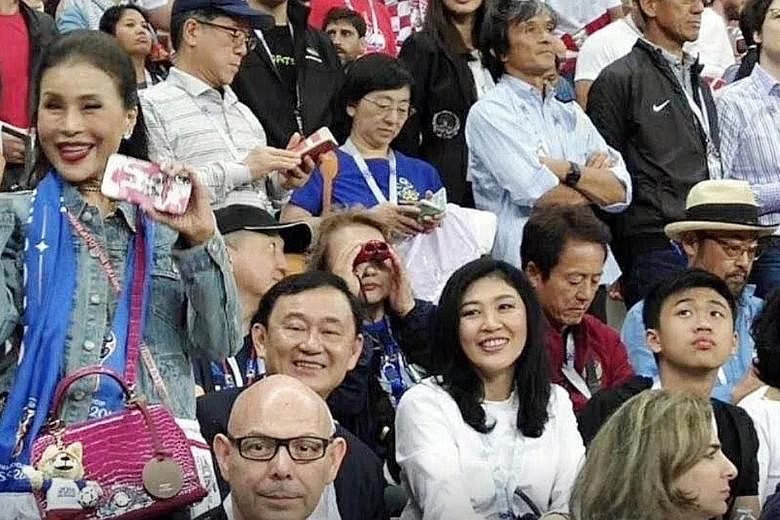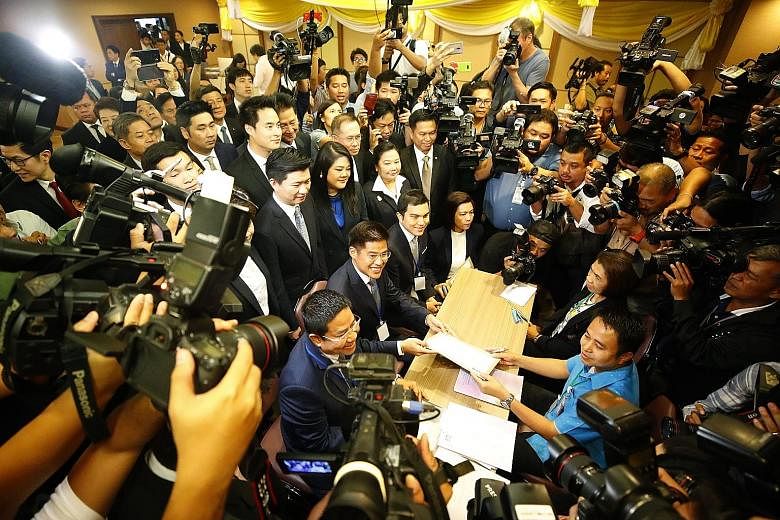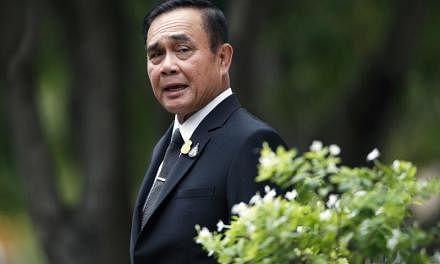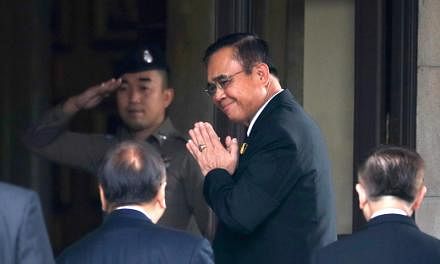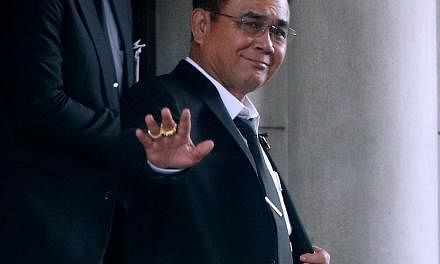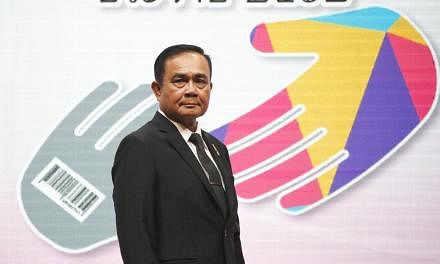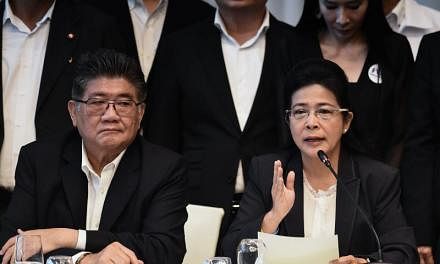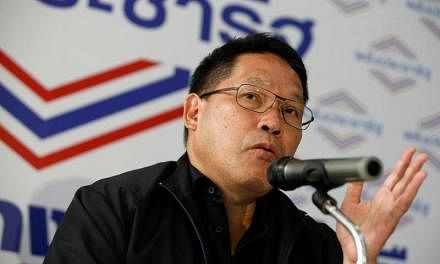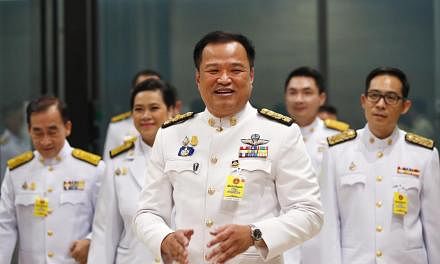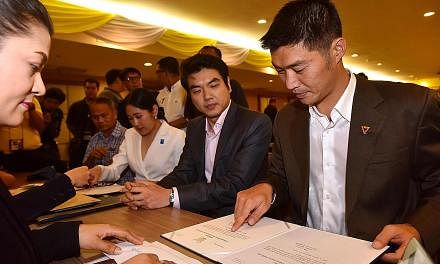The headquarters of the Thai political party in the centre of a royal storm was eerily quiet yesterday morning. Its afternoon campaign in Bangkok was called off. None of its executives would pick up their phones or answer reporters' queries.
A handful of bewildered supporters of Thai Raksa Chart Party milled around the office compound in Chaengwattana Road. "Please join us here to show support, there is no one here to oversee matters," one of them pleaded on her mobile phone.
Rumours swirled about the fate of its executive committee, after a late-night statement from King Maha Vajiralongkorn declaring it was highly inappropriate, and even unconstitutional, for his elder sister Ubolratana Rajakanya to be involved in politics.
It was an order that effectively buried Thai Raksa Chart's bid - that lasted 13 hours - to nominate her as its prime ministerial candidate for the March 24 election.
Backed by the palace statement, royalist politician Paiboon Nititawan has demanded that the Election Commission start discussions to dissolve Thai Raksa Chart. A party that shocked the nation with its audacious bid to rope in the King's sister could now be fighting for its survival.
THE PHEU THAI SPLINTER
Thai Raksa Chart is just three months old. Headquartered in a rented office compound on the dusty outskirts of Bangkok, it was formed after the military government loosened restrictions on political activity in preparation for an election.

It does not try very hard to hide the fact that it is a purposeful splinter of the Pheu Thai Party, which won the 2011 election with a commanding majority, only to be kicked out via a military coup in 2014.
Like Pheu Thai, Thai Raksa Chart is linked to Thaksin Shinawatra, a fugitive tycoon and former prime minister who was an adroit electioneer but widely reviled by royalist pro-military factions and blamed for cleaving the country. Thaksin was ousted in a 2006 military coup and lives abroad to evade a jail term for conflict of interest. His strategy of boosting domestic demand to prop up the economy was often tagged as "Thaksinomics".
The Thai initials for Thai Raksa Chart are the same as those for Thaksin's name. Last month, the party unveiled its plan to pursue "techsynomics" - using technology to raise economic prospects.
Several "new generation" politicians introduced by Pheu Thai in September last year hopped over to Thai Raksa Chart mere weeks later. They included Thaksin's niece Chayika Wongnapachant and Mr Ton Na Ranong, the son of former finance minister Kittirat Na Ranong. Other conspicuous former Pheu Thai bigwigs are former deputy prime minister Chaturon Chaisaeng and former energy minister Pichai Naripthaphan.
Thailand's post-coup Constitution reduces the chances of big parties dominating Parliament. Splinter parties like Thai Raksa Chart help Pheu Thai maximise the number of seats it can control in the future legislature.
In an interview with The Straits Times last year, Thai Raksa Chart's leader Preechapol Pongpanit said: "We play by the rules even though we know this Constitution is not designed for us. We have to play by the rules to sustain the hope of the people who support us."
A few months later, it would go on to skirt a major time-honoured rule.
ROYAL OR COMMONER?
Whispers about Ms Ubolratana joining Thai Raksa Chart first surfaced early last week.
Under the new election rules, parties wanting to nominate prime ministers have to name these individuals before the election.
Mr Preechapol told reporters that his party would have a prime minister nominee by the Friday deadline. "There might be a surprise," he said.
Taking the cue, Thai media outlets went to town with stories of this "big surprise", and talk grew louder about a "very important person".
Still, the party kept mum. On the eve of the submission deadline, as speculation rose to fever pitch, key party member Nattawut Saikua was asked by reporters about a "very important person" being nominated as prime minister.
"The executive committee members will decide on that," he said firmly. "I cannot confirm this."
Disbelieving royalists and aristocrats rubbished the rumours. Prince Chulcherm Yugala, a retired army major-general, wrote on Facebook: "This country is nonsense and it is babbling."
Ms Ubolratana, 67, is known to have cordial relations with the Shinawatra clan. Last year, she was even photographed watching a World Cup match with Thaksin and his sister Yingluck. Like Thaksin, Yingluck is a former prime minister who fled Thailand to avoid a jail term for negligence.
Still, it was inconceivable that someone so close to the King would agree to become a politician - a class of people often painted as corrupt and self-serving by the elite.
But Ms Ubolratana is an unconventional royal. Born Ubolratana Rajakanya Sirivadhana Barnavadi, she is the eldest child of the late King Bhumibol Adulyadej and Queen Sirikit. Apart from the current monarch, she has two other siblings - Princess Sirindhorn, 63, and Princess Chulabhorn, 61.
She relinquished her royal title in 1972 to marry an American whom she met while studying at the Massachusetts Institute of Technology. But she continued to be treated as a member of the royal family after she divorced him in 1998 and moved back home.
Even though Ms Ubolratana sings, acts and keeps a well-followed Instagram account, she appears in a television variety show with presenters kneeling on the floor in deference.
After her father died in 2016, she stood alongside her siblings as they held elaborate last rites - aired on national television.
While addressed with the title "Tunkramom Ying" which means "Daughter to the Queen Regent", she often calls herself a commoner.
It was this grey area that would eventually unravel Thai Raksa Chart.
SHOCK AND AWE
At the auspicious time of 9.10am on Friday, Mr Preechapol, dressed in a sharp navy-blue suit and accompanied by party members, sat before Election Commission officials with a brown envelope bearing his party's prime minister nomination form.
With TV stations broadcasting the event live, he opened the envelope and unveiled a form bearing Ms Ubolratana's signature and her smiling photograph, setting off a frenzy among the journalists massed around the table.
Far away from the scrum, Ms Ubolratana wrote on Instagram: "I would like to exercise my rights and freedom as a commoner under the Constitution."
For a while, it looked like the Thaksin-linked faction - ousted frequently by court rulings and military coups for over a decade and bound by new constitutional rules - had turned the tables on its rivals.
Social media exploded with memes pitting Ms Ubolratana against Prime Minster Prayut Chan-o-cha, a former army chief who staged the coup in 2014 and was seeking a comeback as premier after the election through his nomination by the Palang Pracharath Party.
Thais reeled in shock as they tried to understand how a royal family member, considered above politics, could enter an election - and also join a faction often painted by rivals as being anti-monarchy.
Bound by a strict decorum that applies to discussion about royal family members, enraged anti-Thaksin royalists and palace circles lobbied for intervention behind the scenes.
The lone official dissent came from royalist politician Paiboon Nititawan, who submitted a request on Friday afternoon asking the Election Commission to nullify the former princess' nomination. The Election Commission had until Feb 15 to decide.
But a statement by the King, uploaded on the Royal Gazette and aired on television at around 10.30pm, made the call.
Ms Ubolratana "lives as a member of the Chakri dynasty" and "involvement of a high-ranking member of the royal family in politics, in whatever way, is an act that conflicts with the country's traditions, customs and culture and therefore is considered extremely inappropriate", the statement said.
LEGAL PERIL
Political veterans and activists know what is coming next.
"I think Thai Raksa Chart Party should change its executive committee," said Ms Tida Tawornseth, an adviser to the "red shirt" United Front for Democracy Against Dictatorship, which has members in Pheu Thai and Thai Raksa Chart. "Right now, it's very dangerous. They could dissolve the party."
Thaksin's first party, Thai Rak Thai, was dissolved in 2007 for electoral fraud and its key members were banned from politics for five years. Its next iteration, the People's Power Party, was dissolved one year later.
If Thai Raksa Chart is ruled to have violated election rules by nominating Ms Ubolratana as its prime ministerial candidate, it will very likely face the same fate.
Once the constitutional court accepts a petition to consider dissolving the party, the Election Commission has the power to stop the party from campaigning in the election, said Dr Stithorn Thananithichot, a political scientist from King Prajadhipok's Institute.
This will make Pheu Thai's splintering strategy go awry, channelling its votes to other parties like the progressive-minded Future Forward Party.
After hours of silence, Thai Raksa Chart issued a statement yesterday saying that it would heed the King's order.
"Thai Raksa Chart Party complies with the royal command with loyalty to the King and all members of the royal family," it said.
By way of consolation, Thaksin tweeted: "Chin up and keep moving forward!"
Mr Preechapol's mother, Ms Rabiebrat Pongpanit, was quoted by reporters as assuring that her son was "fine".
But the party headquarters remained deserted in the afternoon, its brief dalliance with royalty having cast a threatening pall over its future.
- Additional reporting by Kannikar Petchkaew
